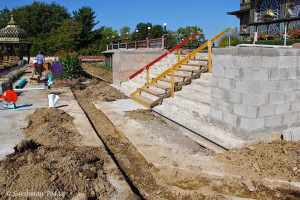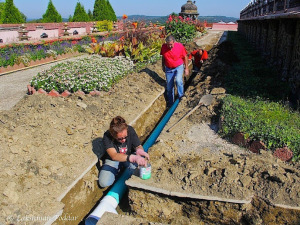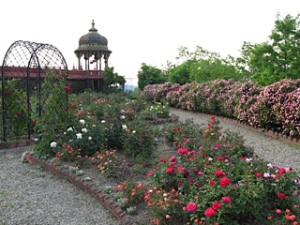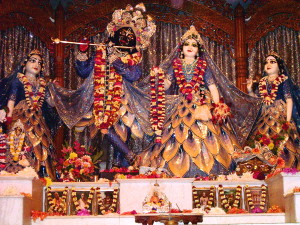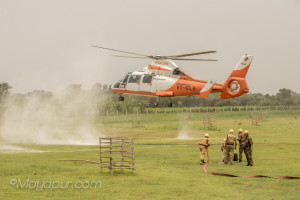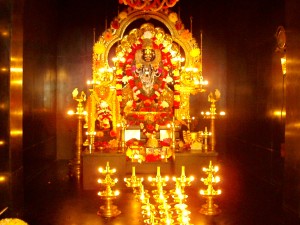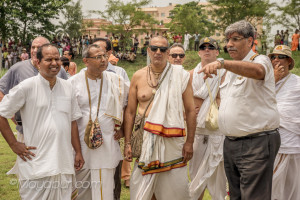The post September 26th, 2014 – Darshan appeared first on Mayapur.com.
September 26th, 2014 – Darshan
Good Words
→ Tattva - See inside out
- Personal level – Rather than being critical, judgmental or aloof, we evolve into selfless agents of positive change. Since prayer invokes divine intervention, we are not simply observers of the world, but can make a difference, even to people we have very little physical contact with. In such moments of noble prayer, we rise beyond self-absorption and forget our own difficulties.
- Relationship level – Taking the time to deeply contemplate someone’s life transforms our relationship with them. We learn to see beyond the external chaos, appreciating that everyone is a pure soul trying to break free from material entanglement. Prayer helps one to connect with people on a deeper level.
- Social level – When a group of people form, each one sincerely wanting the others to excel, it creates a unique spiritual energy. That unity, fellowship and genuine warmth helps them to achieve their goals and transform the world. Prayer brings people together.
It reminded me of how Swami Prabhupada would sign off his correspondence with “your ever well-wisher.” His prayer was completely selfless; a natural consequence of his incredible compassion and concern for all. Saintly persons are said to feel another’s pain as their own (para dukha dukhi). Just as we spontaneously attend to any ailment in our body, they are spontaneously impelled to relieve the suffering of the general populace. Even if we fall short of that pure stage, we can still institute the process of selfless prayer as a vehicle to developing deeper sensitivity, which is so integral to spiritual advancement. After all, we find ourselves by thinking of others. Try it out this week – take a few quality moments to sincerely pray for the wellbeing of someone else. And if you’re finding it difficult to identify someone, you could always slip in a good word for this struggling soul. :)
Renovations at Prabhupada’s Palace of Gold in New Vrindaban
→ New Vrindaban Brijabasi Spirit
External Renovations at Prabhupada’s Palace of Gold
By Gopisa das & Lilasuka dasi
There have been many renovations done in New Vrindaban over the last two years. Govinda’s Restaurant received a complete overhaul, including a drop ceiling and ornate Rajasthani style furniture. The Welcome Center, once an old wooden cabin, was brought up to date with high tech insulation and new exterior/interior improvements. The men’s and women’s asramas were renovated with new lighting, walls, floors and furniture and the Palace Lodge rooms were greatly improved with similar treatment.
This year, Prabhupada’s Palace of Gold is receiving some much-needed repairs. Renovations have begun with all new storm drainage pipes on the exterior second level. This is the first phase of an extensive design plan to handle all rain/snow water from roof to ground level and a necessity for protecting the soon to be installed new granite steps.
The work is part of a new push to fully renovate and improve Srila Prabhupada’s Palace with major visual improvements planned for completion by 2016 as an offering to Srila Prabhupada on the 50th anniversary celebrating the formation of his beloved ISKCON.
Stay tuned- more to come.
SJMKL – Youth Girls
→ ISKCON Malaysia Photos
SJMKL – Youth Girls
→ ISKCON Malaysia Photos
SJMKL – Youth Girls
→ ISKCON Malaysia Photos
SJMKL – Youth Girls
→ ISKCON Malaysia Photos
SJMKL – Youth Girls
→ ISKCON Malaysia Photos
SJMKL – Youth Girls
→ ISKCON Malaysia Photos
SJMKL – Youth Girls
→ ISKCON Malaysia Photos
SJMKL – Youth Girls
→ ISKCON Malaysia Photos
SJMKL – Youth Girls
→ ISKCON Malaysia Photos
SJMKL – Youth Girls
→ ISKCON Malaysia Photos
HG Pankajanghri Prabhu at ISKCON Mayapur on 2014-09-20
→ Gouranga TV - The Hare Krishna video collection
HG Pankajanghri Prabhu at ISKCON Mayapur on 2014-09-20, Srimad Bhagavatam Canto 05 24 23 24
Gita 01.05 – Affiliations were shaped by long-term affinity not short-term antipathy
→ The Spiritual Scientist
HG Mother Sucarya / The Krishna Book
→ Kalachandji's Audio Archive
HG Balaram Prasad Prabhu / SB 10.70.04-05
→ Kalachandji's Audio Archive
Initiation Ceremony, September 25, Tucson, Arizona
Giriraj Swami
 Giriraj Swami read and spoke from The Nectar of Instruction (Srila Rupa Gosvami’s Upadesamrta):
Giriraj Swami read and spoke from The Nectar of Instruction (Srila Rupa Gosvami’s Upadesamrta):
” ‘Diksa, or spiritual initiation, is explained in the Bhakti-sandarbha (868) by Srila Jiva Gosvami:
divyam jnanam yato dadyat
kuryat papasya sankshayam
tasmad dikseti sa prokta
desikais tattva-kovidaih
“By diksa one gradually becomes disinterested in material enjoyment and gradually becomes interested in spiritual life.” ‘ (NOI 5 purport)
“Divyam jnanam yato dadyat: It is the process by which spiritual knowledge is given. Then kuryat papasya sankshayam: It is the process by which sin is destroyed. Tasmad dikseti sa prokta desikais tattva-kovidaih: This process is known as diksa, or initiation, by those who are learned and expert in the study of scriptural truth. And Srila Prabhupada makes it practical in terms of the Krishna consciousness movement:
” ‘We have seen many practical examples of this, especially in Europe and America. Many students who come to us from rich and respectable families quickly lose all interest in material enjoyment and become very eager to enter into spiritual life. Although they come from very wealthy families, many of them accept living conditions that are not very comfortable. Indeed, for Krsna’s sake they are prepared to accept any living condition as long as they can live in the temple and associate with the Vaisnavas. When one becomes so disinterested in material enjoyment, he becomes fit for initiation by the spiritual master.’ ” (NOI 5 purport)
Marriage, Daughters, Mothers & Krishna…
→ The Enquirer
Marriage, Daughters, Mothers & Krishna…
Śrīmad Bhāgavata 3.22.21:
Kardama said this much and not more, for he became overcome with the memory of the Lotus-Navel’d Hari. He smiled from that memory and that smile captivated Devahūti’s heart.
Devahūti is an incalculably elevated devotee, she is directly empowered by/ connected to Yaśodā Mā, for she is the mother of Krishna’s incarnation, Kapila. She had decided to marry Kardama, and when she saw Kardama’s bhakti for Hari she became so pleased and confident in her decision.
This is the guideline for marriage in bhakti-yoga. It is not important if the spouse is attractive or strong, etc. What forms the bond in bhakti-yoga is the spouse’s devotion to Hari. When one spouse sees devotion to hari in the other, they become dedicated to serve and they feel deep spiritual affection.
22:
Manu asked his Queen and his daughter for their final confirmation and, receiving it clearly, granted his delighted daughter to the sage, whose endless hosts of fine qualities was equal to hers.
We do not find male chauvinism is Śrīmad Bhāgavatam, although unfortunately we regularly encounter it in the world, and often even within the world’s spiritual organizations. The Śrīmad Bhāgavatam, here spoken by Maitreya Muni, openly and plainly glorifies great women on an equal level with great sages.
23–25:
Emperor Manu was relieved to have given his daughter to a good husband, but his heart was still beleaguered with sadness, so he embraced her tightly in his arms. Unable to bear the thought of leaving her, he became drenched in tears. “O Mother… O my Child…” was all he could say, as she dried his tears with her hair.
Calling a woman “Mother” (Amba, Mā, Mātā, etc.) does not mean “You are my mother.” It simply means “you are a mother.” Manu addressed his daughter as Amba, “Mother” because now she was all grown up and would become a mother. He was saying “Amba! Vatsa!” and crying. Vatsa means “child.” He was saying “O mother… O my child….” because he was thinking, “Oh my child will now become a mother.”
It is difficult for a parent when the child exits childhood, because then Vatsalya-rasa can no longer be fully tasted. All the same, because a parent has some unconditional love for the child, mixed with their sadness is happiness that their child successfully grows up.
The next section of verses will describe the King’s return to his city…
26:
The emperor asked for permission to leave and the great scholar Kardama granted it. He got on his chariot with his wife and they departed with their followers for their own city.
27:
They traveled along the tranquil Sarasvatī river, whose two beautiful shores were wealthy with the āśramas of many families of sages.
28:
His citizens heard of his return and joyfully came out to greet their protector with music and songs of praise.
29–30:
His city, named Barhiṣmatī (Place of Light) was full of all wealth. It was built where the hairs of the Board had fallen when he shook his body. Those hairs became the evergreen kuśa and kāśa grasses, which the sages used to worship him after he defeated the disrupter of sacrifice, Hiraṇyākṣa.
It was named “Place of Light/Fire” because this is where the sages lit sacrificial fires and worshiped Varāha with Kuśa and Kāśa after he defeated Hiraṇyākṣa.
31:
Blessed Manu made a fan of kuśa and kāśa grass and worshipped Varāha, who had delivered the world into his care.
Before entering his city, he stopped in the fields and worshipped Varāha.
32:
Then he entered the great city, Barhismatī, and returned to his palace, which conquers the three miseries.
Manu’s palace was so delightful that inside it one forgets any pains caused by ones body and mind, by other people, or by nature. The next section of verses will describe how this is possible — because Manu created a transcendental atmosphere inside the palace, filling it with Viṣṇu śravana, kīrtana, smarana . The next section describes this and describes Manu’s exalted character. The 22nd chapter will end after that brief section, it is a fairly short chapter.
Prabhupada Letters :: Anthology 2014-09-25 23:24:00 →
Prabhupada Journal :: 1966
Prabhupada Letters :: Anthology 2014-09-25 23:23:00 →
Prabhupada Letters :: 1969
Prabhupada Letters :: Anthology 2014-09-25 23:22:00 →
Prabhupada Letters :: 1969
Prabhupada Letters :: Anthology 2014-09-25 23:20:00 →
Prabhupada Letters :: 1969
Prabhupada Letters :: Anthology 2014-09-25 23:17:00 →
Prabhupada Letters :: 1970
Prabhupada Letters :: Anthology 2014-09-25 23:16:00 →
Prabhupada Letters :: 1970
Prabhupada Letters :: Anthology 2014-09-25 23:13:00 →
Prabhupada Letters :: 1972
Prabhupada Letters :: Anthology 2014-09-25 23:12:00 →
Prabhupada Letters :: 1972
Prabhupada Letters :: Anthology 2014-09-25 23:04:00 →
Prabhupada Letters :: 1974
Mayapur Helicopter Service
→ Ramai Swami
Recently, there was a successful test landing of an 11 seater Pavanhans helicopter in the parking lot near the Vamsi Bhavan guest house.
Durgapur Airport authority of Bengal, were received with warm Vaisnava
welcome by deputy directors & managers of Mayapur.
Please Join The Japa Group
→ Japa Group
Renovations at Palace of Gold in New Vrindaban
→ New Vrindaban

There have been many renovations done in New Vrindaban over the last two years. Govinda's Restaurant received a complete overhaul, including a drop ceiling and ornate Rajasthani style furniture. The Welcome Center, once an old wooden cabin, was brought up to date with high tech insulation and new exterior/interior improvements. The men's and women's asramas were renovated with new lighting, walls, floors and furniture and the Palace Lodge rooms were greatly improved with similar treatment.
This year, Prabhupada's Palace of Gold is receiving some much-needed repairs. Renovations have begun with all new storm drainage pipes on the exterior second level. This is the first phase of an extensive design plan to handle all rain/snow water from roof to ground level and a necessity for protecting the soon to be installed new granite steps.
The work is part of a new push to fully renovate and improve Srila Prabhupada’s Palace with major visual improvements planned for completion by 2016 as an offering to Srila Prabhupada on the 50th anniversary celebrating the formation of his beloved ISKCON.
Stay tuned ─ more to come.
By Gopisa das & Lilasuka dasi
Finding My Perfect Master, September 21, Tucson, Arizona
Giriraj Swami
Giriraj Swami spoke during the Sunday program in Tucson.
“We got to Harvard Square and I let the devotees out the car. Then I suddenly realized. ‘I don’t know how to find them. I don’t know where their ashram is’. So I stopped the car, jumped out and caught up with the devotees. As the group was walking away the last devotee was Patita Pavana dasa. He looked at me and said. ‘Just look at all these people. They are like sleepwalkers, they don’t even know who they are or where they are going.’ It was like everything the devotees were saying was so captivating. Suddenly my thoughts were interrupted by the sound of horns honking and I realized my car was blocking the intersection and all these angry motorists were honking their horn’s waiting for this red Rambler station wagon to move out the way.”
Fault Finding or Encouragement?
→ simple thoughts
It is far better to discharge one’s prescribed duties, even though faultily, than another’s duties perfectly. Destruction in the course of performing one’s own duty is better than engaging in another’s duties, for to follow another’s path is dangerous.
BG3.35
Fault finding
Quoting scripture is easy, the vedabase makes it even easier to find and use scriptures to justify an action or point of view, quote re-quote even quoting hear say; surrounding ourselves with those who agree with our own point of view.
Faultfinding is one of the most dangerous paths to take, especially when it becomes bark and sinister and the path or looking at getting the person removed. We find fault the single fault becomes a double fault before very long all we can see is the persons fault and not the hard work they also do.
Belief we can also do better than them, fault finding turns to ridicule, the mind becomes agitated our own joy and service begins to suffer and suffer some more.
Knowing scripture, quoting scripture I wonder why pacifically the opening statements in this Gita first reminds us of our duty; each has a duty a service to perform that helps in one way or another in increasing Krishna Consciousness throughout the world.
Interestingly the second statement is revealing “even though faultily” whether we like it our not being under the modes of material nature despite our greatest efforts their is going to be some fault; even of this is small.
Thirdly “than another’s duties perfectly” Yes we could maybe be much better than another at doing a pacific duty but in the material world whilst we focus on pointing out this our own duty could become faulty. Worse our own spiritual well-being could suffer, and rather than removing the person we are finding fault with being removed we run the risk of fall down and removal yourself.
Humble like a straw in the street
Humbly look not at the faults in others service but see the beauty and dedication, as we focus more and more on the perfection of service we see more perfection and any fault pails into insignificance.
Not only does it improve our dealings with others but also improves the quality of our own service; well that has been my experience.
Neglected
Feelings of being neglected, we all went to feel appreciated; life is complicated and it is a rare soul that has the opportunity to do seva so engagement in service is the perfection of life. Just a quick word of encouragement makes the biggest difference, a word of displeasure or faults immediately discouragement.
Avoid actions that lead to others discouragement for ultimately overtime our own discouragement will set in; encourage support and be their for others will increase not only your love for the person but your love and desire to increase your own seva.
Well that is my few thought’s
And as always I look forward to hearing from others their own thoughts and realisations
Hare Krishna
BBT Media Releases “Beyond Birth and Death” E-book
→ ISKCON News

Another well-known title, Beyond Birth and Death, by His Divine Grace A.C. Bhaktivedanta Swami Prabhupada is now in e-book form and available at bbtmedia.com. In this small yet profound book, Srila Prabhupada tells readers how the soul travels from one body to another and presents startling evidence of its incredible journey after death.
World’s Almond Supply Approaching Collapse Due to California Drought
→ ISKCON News
“Blossoming of Vedic Life in Rural Hungary”- Art Exhibition Opens in Budapest, Hungary
→ ISKCON News

On September 18th a special art exhibition opened at the Cultural Center of the Indian Embassy in Budapest, Hungary. The “Blossoming of Vedic Life in Rural Hungary” exhibition displays over 40 original drawings from ISKCON-guru and author Sivarama Swami’s new book the Nava Vraja Mahima, a monumental work in glorification of New Vraja Dhama (or Krishna-valley), a rural Vaishnava community in Hungary.
Mantra Lounge (3 min video)
→ Dandavats.com
 If you’d like a dose of soothing meditation and kirtan to start the weekend, join us for Mantra Lounge. In the intimate setting of Neal’s Yard, Covent Garden, we meet twice a month to sing together. Each session is led by a different kirtan artist and often features guided meditation, beautiful musicians and visuals. Read more ›
If you’d like a dose of soothing meditation and kirtan to start the weekend, join us for Mantra Lounge. In the intimate setting of Neal’s Yard, Covent Garden, we meet twice a month to sing together. Each session is led by a different kirtan artist and often features guided meditation, beautiful musicians and visuals. Read more › How to Make Wise Decisions and Stick with Them
→ HH Bhakti Caitanya Swami
Eating with Your Hands is Healthier
→ ISKCON News
Tuesday, September 23rd, 2014
→ The Walking Monk
Watch Where You Sit
Everyone was very careful where to plop their buttocks. Those Canada geese do a fairly good job at leaving their droppings on the campus grass.
York University was the venue near what everyone calls, ‘The Fountain’. Some students, some monks and I received full approval via the Krishna Club to help ourselves to the green grass for chanting, drumming and schmoozing. One of our monks, Hayagriva, took his bag of bhakti books around trying to interest students in the sublime philosophical outlook of bhakti¸devotion. There were takers.
There were also takers to our kirtan. One young Ethiopian student sat with us, with care, on the grass, soaking in the sound. Many other students very indifferently walked by and some even nonchalantly helped themselves to the grass, with prudence, to sit or lie down near us. I believe that in their own way they were expressing interest in our sound.
I particularly enjoyed when some students, two guys and a gal, came armed with djembes and one dundun. This thumping lent itself to our musical efforts. It’s always great to have back up to the sound of Hare Krishna Hare Krishna, Krishna Krishna Hare Hare, Hare Rama Hare Rama, Rama Rama Hare Hare.
Our drive home was crazy. There was so much traffic and construction, all in preparation for next year’s PanAm games. You have to watch the traffic like you do the geese dung. Frankly, I would rather come face to face with organic bird mush over oncoming metal monsters in the form of cars.
May the Source be with you! Watch where you drive, sit, stand, walk, run and lie down.
6 KM

